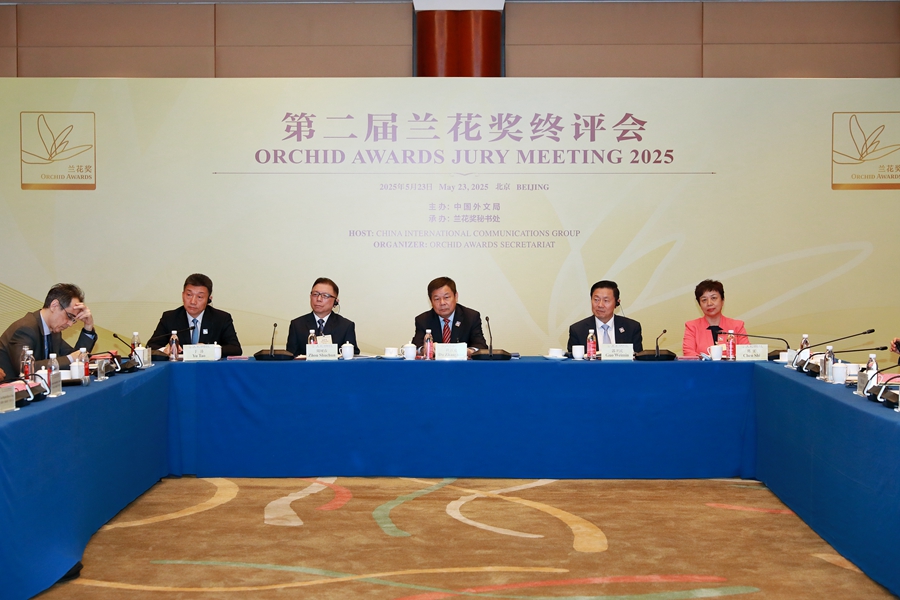
The Second Orchid Awards Jury Meeting is held in Beijing, May 23, 2025. [Photo courtesy of the Orchid Awards Secretariat]
The Second Orchid Awards Jury Meeting was held Friday in Beijing, bringing together 23 judges from 10 countries: China, Lebanon, Japan, Thailand, Egypt, Spain, Italy, the United Kingdom, Mexico and Australia.
The jury recommended 10 recipients for the awards, honoring their outstanding contributions to promoting exchanges and mutual learning among civilizations. The awards include one Lifetime Honorary Award, three Outstanding Achievement Awards, and six Friendship Envoy Awards.
After the evaluation, the Chinese and international judges participated in an in-depth dialogue themed "Bridging a Turbulent World Through Civilization Exchange: The Contemporary Value of the Orchid Awards."
Du Zhanyuan, chair of the Second Orchid Awards Expert Committee and president of China International Communications Group (CICG), emphasized that civilizational exchange and mutual learning play a vital role in building consensus and addressing global challenges.
He said CICG will continue to use the awards as a platform to encourage nations to draw wisdom from each other's civilizations, fostering shared development and prosperity. He said dialogue among civilizations should be a foundation for global peace, progress and shared values, ultimately contributing to building a human community with a shared future.
Zhou Shuchun, deputy chair of the expert committee and executive vice president of the China Foundation for Human Rights Development, said the Orchid Awards reflect profound Chinese values and embody the philosophy of "beauty in diversity and harmony in coexistence."
He stressed the growing importance of the awards and the value behind the awards in today's volatile world, advocating their global promotion to help cultivate a more peaceful and stable international order.
Franco Amadei, a jury member and former cultural counselor of the Italian Embassy in China, underscored the crucial role of global civilizational dialogue in bridging differences and fostering peace. He praised the Orchid Awards as a practical model for implementing the Global Civilization Initiative, saying they help transcend geographical and cultural boundaries by seeking common ground while preserving differences.
Guo Weimin, deputy chair of the expert committee and president of the China Public Relations Association, said people-to-people exchanges are essential for connecting civilizations and advancing human progress. He noted the Orchid Awards inspire confidence in the international community by encouraging mutual understanding and tolerance.
Javier Garcia, a jury member and senior international journalist, commended the awards' unique role in transforming dialogue among different civilizations into creative solutions for global challenges and encouraging a civilization model based on cooperation and mutual respect.
Liu Limin, a judge and president of the China Education Association for International Exchange, said distinguished educators are not only conveyors of knowledge but also enablers of cultural understanding. He emphasized the importance of educational collaboration in bridging global divides and strengthening international friendship.
Nakano Satoshi, a jury member and senior director of the Japan-China Cultural Exchange Association, cited the 2,000-year history of China-Japan relations as proof that true friendship is based on empathy and acknowledgment of historical experiences. He praised the Orchid Awards for motivating practitioners to bridge civilizational divides and lay foundations for a human community with a shared future.
Wang Chunfa, a judge and president of the China Science Writers Association, emphasized the guiding role of the Orchid Awards in promoting global cultural exchange and mutual learning. He said that the awards serve as a powerful example of advancing world peace and development by honoring individuals and institutions with significant contributions.
Bashar Salahuddin Tawfiq Shbaro, a jury member and secretary-general of the Arab Publishers Association, said culture is both a catalyst for development and a vehicle for mutual understanding. He praised the Orchid Awards for exemplifying the essence of civilizational mutual learning and providing a vital platform for intercultural dialogue, sending the message that true development is based on respect and understanding, not force.
Launched by CICG, the Orchid Awards are a major international cultural initiative honoring individuals and organizations worldwide who are committed to promoting Chinese culture and facilitating exchanges and mutual learning among civilizations.
Since the launch of its call for nominations in January, the awards have received widespread international attention, attracting nearly 300 applications from about 80 countries.